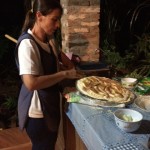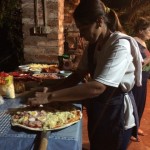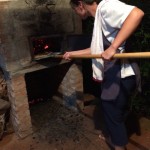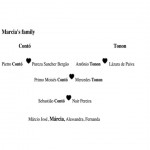‘Lavora na fazenda’
25 Jan 2016, by in WorkThis sequence of images shows Marcia Contó making a series of different and varied pizzas (including a plátano pizza) at a birthday party held at the Fazenda Santa Cecília, Bernardino de Campos, a municipality in the state of São Paolo, on the 4th January 2016.
Marcia is a member of the fourth generation of the Italian Contó and Tonin families.
Marcia’s tataravô (grandmother’s grandfather) (came to Brazil from Italy to work in the coffee farms. He spoke Italian but it was not passed down through future generations. Marcia’s avó (grandmother) who is 88 years old does not speak Italian. However, some words persist in everyday speech such as ‘lavora’ (work), as do certain customs relating to food such as preparing the massa (pasta) or macarraô (spaghetti).
Her father Sebastião Contó worked the land and grew coffee in nearby towns of Timburi and Piraju and paid the ‘meieiro’ (the half) of his produce in return for the use of the land.
The family, parents, three sisters and a brother, came to live at Fazenda Santa Cecília when Marcia was 10 years old. Her father was employed as an agricultural worker, electrician, and talented builder who built the fazenda’s capela (chapel). After 22 years at the fazenda he bought his own sitio (smallholding) where he now lives with his wife and his mother, keeping animals and producing coffee and maize.
Marcia is the first member of her family not to work directly with the production of coffee. She lives in the nearby village, Bernardino de Campos, and travels to the fazenda where she works as a housekeeper while her brother, Marcio, works as a tractor driver on the coffee farm.
Thanks to co-researchers Marcia Contó and Jorge Robert Whately Adair.
Attribution: Margaret Hills de Zarate 4th January 2016.










Sorry, the comment form is closed at this time.